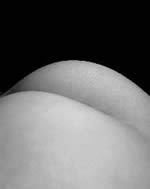Hemorrhoids can be painful and annoying
 But don't dispair, there are treatments that can bring relief and there are a few things you can do to prevent internal and external Hemorrhoids.
But don't dispair, there are treatments that can bring relief and there are a few things you can do to prevent internal and external Hemorrhoids.
Haemorrhoids are abnormally swollen veins in the rectum and anus. They are much like varicose veins you might see on a person's legs. When bulging hemorrhoidal veins are irritated, they cause surrounding membranes to swell, burn, itch, become very painful, and bleed.
Haemorrhoids are caused by too much pressure in the rectum, forcing blood to stretch and bulge the walls of the veins, sometimes rupturing them.
The Most Frequent Causes of Haemorrhoids
- Constant sitting
- Straining with bowel movements (from constipation or hard stools)
- Diarrhoea
- Sitting on the toilet for a long time
- Severe coughing
- Childbirth
- Heavy Lifting
Some people have hemorrhoids but have no symptoms for ages until one day the hemorrhoid gets aggravated and shows signs of pain or itching. Sometimes there can be a small amount of blood from the anus after being on the toilet, but no pain. Ususally if it is fresh red blood it is from a haemorroid, if it is dark blood it could be also from an ulcer etc.
It is a good idea to have it checked out anyway for your own peace of mind.
There are Two Kinds of Haemorrhoids: Internal and External
Internal haemorrhoids usually don't hurt or itch; you can't feel them because they are deep inside the rectum. Internal haemorrhoids are pretty harmless. But since their bleeding could mask blood from a dangerous source like colorectal cancer, they should be treated.
External haemorrhoids cause most of the symptoms we commonly hear about --- pain, burning, and itching. If an external haemorrhoid becomes strangulated (cut off from blood supply), a clot can form in it and become an excruciatingly painful thrombosed haemorrhoid.
Because of these unpleasant symptoms, external haemorrhoids get the most treatment attention.
Once the rectal veins have been stretched out and haemorrhoids created, they are difficult to get rid of completely and tend to recur with less straining than it took to cause them in the first place. Fortunately, good habits and simple medical treatment usually control haemorrhoids well, and surgery is only recommended in unusually severe cases.
Prevention
Avoiding the causes will prevent most cases of haemorrhoids, but this advice is sometimes hard to follow.
For example, how can you avoid sitting all day if you have a seated job? And most of us would like to avoid coughing, diarrhoea, and childbirth, but that's pretty much impossible, isn't it?
Here are some practical hints to help:
- If your main job activity is seated, always stand or walk during your breaks. Make it a point to stand and walk at least 5 minutes every hour and try to shift frequently in your chair to avoid direct rectal pressure.
- Always exhale as you strain or lift. Don't hold your breath. Control coughing, diarrhoea and constipation with early treatment since haemorrhoids may soon follow.
- Make a rule: No reading or other relaxing activity while on the toilet. If bowel movements take longer than 3-5 minutes, something is wrong. If you want to keep haemorrhoids away, maintaining good bowel habits and softer stools should be your highest priority.
- Keep your stools soft so they pass easily, thus decreasing pressure and straining, and to empty bowels as soon as possible after the urge occurs.
- Exercise, including walking, and increased fibre in the diet help reduce constipation and straining by producing stools that are softer and easier to pass.
- Blackberries, blueberries and cherries are rich in proanthocyanidin and anthocyanidin which improve the health of blood vessels.
If these preventive measures fail, you must take action right away! Haemorrhoids are one condition that can be mild in the morning and become intolerable by nightfall.
Relieving the Pain
- Clean your anus after each bowel movement by patting gently with moist toilet paper or moistened pads such as baby wipes.
- Use ice packs to relieve swelling. Try the long ice tray sticks that you can buy to put into bottles.
- A Sitz bath with marigold for 10 to 20 minute in a hot tub bath two to four times daily brings heat to the area, provides relief from the pain, and promotes healing.
- Apply a ointment that contains Witch hazel, Pileworth and Marigold.
- Make a strong black tea with comfrey root and horst chestnut. Apply cold with a cotton ball.
- Take hawthorn, garlic, Vitamin C and flavonoid Supplements.
- Homeopathic like Arnica, Sulphur and Nux vomica can be helpful.
- Make a mixture of lemon, lavender, rosemary, cypress and juniper essential oil and add to your bath (not when pregnant).
- Make a small tampon with some gauze soaked in the above oils (or cypress alone)and put into anus, leave overnight, it will come out with your next bowel motion.
- If very painful, apply crushed ice for a few seconds.
Caution
If the onset of your haemorrhoids occurs along with a significant change in bowel habits or if you're passing black, tarry or maroon stools, consult your doctor without delay.
These types of stools can signal more extensive bleeding elsewhere in your digestive tract.
